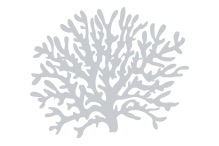Invertebrates
From crabs to octopuses, clams to marine worms, invertebrates play a significant role in ocean ecosystems. Many are important prey for fish, marine mammals, and humans. Others, such as corals and oysters, create essential habitat for marine species.
NOAA Fisheries is responsible for the sustainable management of many species of invertebrates—including white shrimp, Alaska snow crab, and Quahog clam—commonly harvested for human consumption. We are also responsible for protecting invertebrate species listed under the Endangered Species Act such as white abalone and elkhorn coral.
Invertebrates are the most diverse group of animals in the ocean. Some common marine invertebrates include mollusks, crustaceans, and corals.
Mollusks are a category of invertebrates with over 50,000 known species. They are soft-bodied animals that may have a hard external shell (formed by secreting calcium carbonate), a hard internal shell, or no shell at all. Mollusks include abalone, conch, oysters, and clams, as well as octopus and squid.
Crustaceans are a subcategory of invertebrates closely related to insects and spiders. They typically have a body covered with a hard shell or crust. Crustaceans include shrimp, krill, lobsters, and crabs.
Corals are known as colonial organisms because many individual creatures live and grow while connected to each other. The tiny, individual organisms that make up large coral colonies are called coral polyps. Stony, shallow-water corals—the kind that build reef habitat—are one type of coral. There are also soft corals and deep sea corals that live in dark, cold waters.
Species News
 Krill (Thysanoessa inermis). Credit: NOAA Fisheries.
Krill (Thysanoessa inermis). Credit: NOAA Fisheries.
 Coral fragments hang from a nursery tree in the Johnston Applied Marine Sciences' nursery in the Commonwealth of the Northern Mariana Islands. Credit: Victoria Barker/NOAA
Coral fragments hang from a nursery tree in the Johnston Applied Marine Sciences' nursery in the Commonwealth of the Northern Mariana Islands. Credit: Victoria Barker/NOAA
 Chef Tyler Hadfield’s Curried Skate Wings with Tomato-Masala Chutney
Chef Tyler Hadfield’s Curried Skate Wings with Tomato-Masala Chutney
Ring In the New Year With These Crowd-Favorite Seafood Recipes
 Red king crab on the deck of a research vessel. Credit: NOAA Fisheries / Erin Fedewa
Red king crab on the deck of a research vessel. Credit: NOAA Fisheries / Erin Fedewa
Genetic Diversity in Alaska Red King Crab May Provide Resilience to Climate Change
Multimedia

 Glider “Adrian” getting deployed from the R/V Laurence M. Gould. Credit: Andrew Titmus
Glider “Adrian” getting deployed from the R/V Laurence M. Gould. Credit: Andrew Titmus
 A chef prepares various finger foods made from squid fins in the Dr. Matthew Highlands Food Pilot Plant in Hitchner Hall at the University of Maine. Several chefs were invited to create dishes as part of a research project to develop new frozen foods made from squid fins. Photo courtesy of the University of Maine.
A chef prepares various finger foods made from squid fins in the Dr. Matthew Highlands Food Pilot Plant in Hitchner Hall at the University of Maine. Several chefs were invited to create dishes as part of a research project to develop new frozen foods made from squid fins. Photo courtesy of the University of Maine.

Research
Population Biology in the Northeast
We investigate and document the biology and ecology of fish in the western North Atlantic Ocean.
Partnering with the Fishing Industry to Monitor the Northeast Shelf
Fishermen collect environmental data to improve ocean models and inform their own fishing practices.
Shrimp Futures Initiative
NOAA’s Southeast Fisheries Science Center is working to understand the profound challenges facing the Southeast’s shrimp fisheries to help prepare for their uncertain future.
Ecosystem and Socioeconomic Profile Development and Reports
Status of Ecosystem and Socioeconomic Profiles for Northeast fishery stock assessments.
Understanding Sustainable Seafood
Well-managed wild-capture fisheries and environmentally responsible marine aquaculture play an increasingly important role in our food supply, our health, and the environment.









